the salt of life that can solve mineral deficiencies-bamboo salt
Minerals are important components of human cells, participating in the activation activities of certain enzymes and vitamins, regulating human hormones (hormones), and widely participating in life activities, playing an important role. It also successfully completes metabolism such as excretion and detoxification, and has more factors in maintaining health and defending against diseases than other nutrients. The misuse of chemical pesticides and nutrients in modern agriculture seriously pollutes the soil, resulting in a lack of essential minerals in food, which directly affects human health. Many modern civilized diseases such as cancer, cardiovascular disease, and diabetes are the main causes. This book explains the role of minerals in the human body, and pays attention to the natural substance salt, which is rich in minerals. Further understanding of this reason and the characteristics of salt. Studied the production of bamboo salt by high-temperature melting after baking salt in bamboo tubes, and through experiments, understood the changes in minerals. Combined with various papers on bamboo salt, examined the efficacy and characteristics of bamboo salt. My small wish is to understand the most basic characteristics of bamboo salt through this book, and to have a new perspective on bamboo salt in the academic community, providing an opportunity to study it. My greater wish is for everyone to have a correct understanding of the social pathological phenomenon of "The Harm of Salt" through this book. We should re understand the role of salt, and strive to eat more salt and use it well. Let this correct idea become a social consensus, hoping to achieve this lifestyle as soon as possible.

What is a mineral?
Minerals are the main elements and nutrients that make up human tissues, maintain normal physiological functions and biochemical metabolism, and other life activities. Although it accounts for 3.5-4% of human body weight, it plays a significant role in a wide range of life activities. Oxygen, carbon, nitrogen, and hydrogen in the human body or food are the main elements, mainly present in the form of organic compounds, while the rest are called inorganic salts or minerals. The main minerals that the human body requires over 100mg of 90% minerals per day are sodium, chlorine, calcium, magnesium, potassium, phosphorus, and sulfur. The remaining 10% minerals require 100mg or less per day as trace elements, including iron, copper, zinc, manganese, germanium, iodine, silicon, selenium, cobalt, chromium, fluorine, molybdenum, vanadium, boron, platinum, etc. Although these trace elements are small in quantity, they are essential nutrients in biological enzymes and life activities.
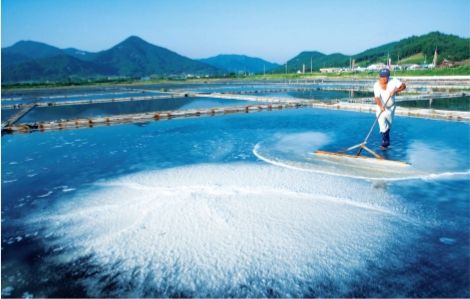
Salt is not simply sodium chloride
Sodium chloride is a compound of sodium and chlorine (refined salt), which contains dozens of minerals such as potassium, calcium, magnesium, iron, copper, manganese, zinc, silicon, sulfur, etc. in addition to sodium chloride. Salt contains the closest proportion of minerals to the human body, and most of the elements needed by the human body are in salt. The human body cannot generate sodium on its own, and without sodium, the body cannot maintain water balance and prevent dehydration; Helps with neural activity and muscle contraction, including myocardial activity; At the same time, nutrients can be transported into cells. Lack of chlorine may lead to insufficient gastric juice and difficulty in digesting fats in food. The activation of biological enzymes also requires manganese, zinc, and magnesium; Maintaining sodium balance cannot be achieved without the action of potassium; Without copper, blood cannot be produced, and calcium deficiency may lead to neurological disorders. From the above, it can be seen that salt is an essential material in human digestion and various metabolism. The various minerals contained in salt play an extremely important role in human life activities, and without their effects, it is difficult for the human body to maintain life. So what can sustain life is salt. If we don't eat salt for a few days, our lives are greatly threatened.
Is salt the culprit of high blood pressure?
"Salt is the cause of hypertension" - The first person to propose this "Salt Harm Theory" was Ambard and Beaujar scholars in 1904. They checked the blood pressure of patients after consuming salt in the experiment and found that hypertensive patients who mainly consumed low salt fruits had a blood pressure lowering effect. In the future, it will be published that salt is a factor in rising blood pressure. However, this experiment did not elucidate the different effects of different salts (refined salt, sea salt, bamboo salt) on the body, so it lacks scientific validity. Pure sodium chloride has an angiotensin-converting enzyme activity that increases blood pressure. However, the impact of mineral rich salts on blood pressure is different. The Sea Salt (Tianri Salt) Life Science Research Institute at Mupu University in South Korea conducted such an experiment, in which salt sensitive mice were given sea salt (Tianri Salt) and table salt (refined salt) to observe systolic and diastolic blood pressure. It was found that the mice in the sea salt (day salt) group had lower blood pressure than those in the salt (refined salt) group. The minerals such as magnesium, calcium, and potassium in sea salt (diurnal salt) promote the external elimination of excess sodium chloride and maintain normal blood pressure.
The research report by Professor David McCarron from Portland Medical University in Oregon, USA, on the dietary habits and health status of 1880372 Americans, was published in a scientific journal. People with high blood pressure have a 19.6% lower calcium intake than those with normal blood pressure, indicating that hypertension is not due to excessive salt intake in food, but rather insufficient calcium intake. High blood pressure specialist Erlang Shibata wrote in the book that salt has nothing to do with high blood pressure.
He wrote, "I want to ask a question to doctors who advocate that salt causes high blood pressure. I have read many medical books and have never seen that taking a large amount of long-term salt can treat low blood pressure." If ordinary people have high blood pressure from eating salt, can low blood pressure patients be treated with a large amount of salt? But no one has raised this question yet, and no one has written it. This incident indicates that there is no fundamental relationship between salt and hypertension, and it also indicates that salt is clearly not a blood pressure boosting food. Despite this, many ordinary people, doctors, and even medical professionals believe that salt is the culprit of high blood pressure, like superstitions. 80% of hypertensive patients have primary hypertension, which is congenital, hereditary, and has unclear causes. The remaining 20% are secondary hypertension. Nephritis, endocrine disorders, renal artery stenosis, drug-induced hypertension, etc.
Our body needs blood pressure to transport nutrients to the body and eliminate metabolic waste. The phenomenon of high blood pressure when eating salt or food is a manifestation of energy for transporting nutrients. Once salt completes this role, blood pressure will return to normal. Without the salt action rich in minerals, we cannot fully digest food and deliver nutrients to cells. Moreover, low salt living can lead to insufficient mineral resources in the human body, resulting in a decrease in enzyme activation function and a decrease in detoxification and immunity. Salt rich in minerals can eliminate excess sodium in the human body, regulate blood circulation, and actually have a positive effect on treating hypertension. Eating sodium chloride (refined salt) results in a lack of antagonistic and complementary minerals in our body fluids, leading to metabolic disorders and loss of normal life activities in the human body. Let's talk about "Salt Induced Hypertension" from the results of experiments conducted regardless of the type of salt, which is a modern superstition created by science!

Recommend using salt to supplement mineral deficiencies in the body
When the Salt Management Act was enacted in South Korea in 1963, it was stipulated that refined salt must be used in the manufacturing and processing of food. Since then, white refined salt has been widely used. The main seasoning has since been replaced by refined salt, so most cafeterias and food processing use refined salt. This regulation has had a negative impact on national health in the past fifty years and is still being followed today. Most catering and food processing industries require refined salt for seasoning and food production. So now salt equals refined salt. For a long time, we consumed refined salt that lacked minerals, and also refined salt with added chemical seasonings to enhance fragrance. Pregnant women should be more in need of supplementing various minerals, but generally do not recognize their importance to the human body, and have also consumed refined salt for a long time. If the human body lacks minerals, it will lead to osteoporosis in bones and teeth, and it will also increase the lack and defect of children's teeth. If it hinders normal metabolism, it can harm children's health. In 1979, Osaka University in Japan organized the Salt Survey and Research Association and published the research results. The harmful effects of processed salt were announced, and it was also stated that "the white salt we consume is: salt that can kill people.". We always thought refined salt was the same. Therefore, it is reasonable to assume that the health hazards caused by refined salt are the same and pose a threat to the health of the people.
Inoue, President of the Japan Food and Nutrition Society, said, "The current era is an unprecedented world where excess and deficiency coexist.". Constantly experiencing a state of physical strength, obesity, malnutrition, and osteoporosis due to a lack of minerals. The warning goes, "Abundant processed food brings about nutritional imbalance in children.". We should recognize that salt is not simply sodium chloride, and different types of salt can have different effects on the human body. The lack of minerals in food and the large amount of pollutants emitted in the air can exacerbate the loss of minerals in the human body. What are the effective methods to eliminate the symptoms of mineral deficiency in modern people? Minerals react with fats, proteins, carbohydrates, vitamins, and other substances to be absorbed by the human body. Occasionally taking vitamin or mineral preparations once or twice may not achieve the effect of restoring physical fitness or changing physical fitness due to a decrease in absorption rate. Therefore, the most effective way to absorb minerals is to cook with mineral rich salt and food, and stick to eating. Salt rich in minerals can supplement the minerals lacking in food and reduce the symptoms of mineral deficiency in modern people.
Usage of Bamboo Salt Granules
Carrying bamboo salt particles the size of a grain of rice with you and taking them with saliva can maintain oral health such as teeth, roots, and tongue, and also have a good effect on bronchial system diseases. Bamboo salt has a salty taste and is a bit uncomfortable to take at first, but if you get used to it, it gradually feels sweet and your mouth feels clean and comfortable. Naturally, your body needs bamboo salt. At the beginning, I felt a bit nauseous and vomited when my stomach was not doing well. This is an improvement reaction caused by the dissolution of phlegm in my stomach, and it will return to normal in 2-3 days. People with this phenomenon need to take bamboo salt more, rather than giving up because it is not suitable for me. They need to gradually adapt and eliminate these symptoms. There are also many healthy people and children who like to eat bamboo salt.
Usage of Bamboo Salt Powder
Drinking bamboo salt powder dissolved water: Mix half a tablespoon (about 3 grams) of mineral water once or twice a day, or drink bamboo salt water when thirsty after drinking to help relieve hangover and replenish the lost minerals.
Brushing teeth with bamboo salt powder: Bamboo salt has a good therapeutic effect on all oral diseases, such as loose roots, difficult chewing, inflammation, bad breath, bleeding, etc. Brushing teeth with bamboo salt and rinsing can solve root inflammation and maintain dental health. Brushing teeth with bamboo salt powder in the toothbrush can effectively treat periodontitis and oral diseases by massaging the roots and teeth. All meals are seasoned with bamboo salt powder.
Add bamboo salt to ginger, jujube, and licorice tea: add a handful of ginger, jujube, and licorice tea. Add 1/3 tablespoon of bamboo salt powder to brew tea, and use 5-7 portions daily. Adding bamboo salt powder to nutritional drinks such as elm tea and barley tea is also acceptable. People without special illnesses can take 4-8 grams of bamboo salt a day and 250 grams a month, which can regulate the pH of the human body.
What is bamboo salt?
Bamboo salt is placed in large green bamboo, sealed with natural loess at both ends, and burned at high temperatures ranging from 700 ℃ to 800 ℃ using pine trees as fuel. After calcination, bamboo turns into bamboo ash, loess turns into pottery cover, and the remaining bamboo salt forms a salt rod shape. Then crush the first calcined bamboo salt and burn it in bamboo. This process is repeated eight times, and by the ninth time of baking, sprinkle pine resin into the fire and adjust the temperature to the maximum limit (1300 ℃), the salt will become liquid. After nine calcinations, the effectiveness of bamboo salt can be best demonstrated. No more, no less, it must be nine times. Crush the completed nine roasted bamboo salt into granules or powder, which is directly taken with saliva or used as a natural salt for food seasoning - bamboo salt. This salt processing method is Renshan:Mr. Kim Yi hoon (1909-1992) publicly disclosed the manufacturing method through serialization in the November 1971-July 1972 issue of the Korean Pictorial, and was later revealed by the world in his 1980 work "Universe and Divine Medicine.".
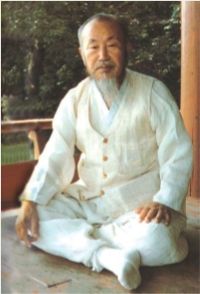
Composition analysis of salt and bamboo salt
The composition analysis results show that the potassium, phosphorus, iron, copper and other mineral contents of bamboo salt are higher after nine calcinations, and the magnesium content sharply decreases after the ninth melting. Magnesium is one of the raw materials used in the production of fireworks and firecrackers, and it belongs to the metallic element, so it basically disappears after high-temperature treatment. Therefore, although magnesium is an important mineral, it is actually difficult to supplement magnesium minerals with bamboo salt. Magnesium is a component of plant chlorophyll molecules, so vegetables are a good supplier of magnesium. A balanced dietary habit can intake necessary magnesium elements and avoid magnesium deficiency. The potassium content in bamboo salt after nine calcinations is 12280ppm and 8870ppm, which is more than twice the potassium content. This may be due to the synthesis of abundant potassium components and salts in green bamboo. People continuously use potassium for research on anti hypertension. Potassium is the opposite of sodium, which helps to activate the sodium potassium pump, dilate blood vessels, and lower blood pressure. When the potassium intake increases, the secretion of aldosterone involved in sodium reabsorption in the ureter and collecting duct in situ decreases, thereby promoting the excretion of sodium through the kidneys. The most significant increase in mineral content in bamboo salt is phosphorus. Phosphorus is second only to calcium in the mineral composition of the human body. Phosphorus is an important substance that makes up the bones and teeth of the human body, and it combines with calcium to maintain the health of the bones and teeth.
Phosphorus is a large amount present in human tissues and an essential substance in human muscle tissue. And it is a component of protein cells, which exists in all cells and participates in the respiration of tissues. It is a necessary component of glutathione in the oxidation and reduction processes of organisms, and also plays a role in preventing heavy metal poisoning and detoxification. Approximately 14ppm of selenium was detected in bamboo salt, which is a component of antioxidant enzymes and participates in antioxidant activity together with vitamins A, C, and E. Its efficacy is 1970 times that of natural vitamin E and 2940 times that of synthetic vitamins, known as antioxidants. It effectively inhibits the toxicity of harmful metals, prevents the activity of carcinogenic substances, and inhibits the growth of cancer cells. According to the medical report implemented by Columbia University in Vancouver, Canada, if adults take chromium and vanadium at the same time when diabetes occurs, the amount of insulin injection can be greatly reduced. Chromium, together with insulin, promotes the uptake and utilization of glucose by tissues and cells throughout the body. If chromium deficiency occurs, it will increase insulin demand. Bamboo salt contains 3-11ppm vanadium, which is about 0.2mg in adults. It is famous for its use in the treatment of diabetes. Vanadium is related to the normal development and calcification of healthy bones, cartilage, and teeth, and is also an essential material for cellular metabolism. It participates in lipid metabolism, hinders the synthesis of cholesterol, and is also a necessary material for human growth and reproduction. Tiny 1ppm germanium was detected in bamboo salt, which is an excellent inducer of interferon. It does not accumulate in the human body and plays an important role in cancer prevention and immunotherapy, attracting attention.
Another important mineral in bamboo salt is platinum, which contains 3ppm. There are many types of anticancer agents developed using platinum, and they are also widely used in cosmetics and healthy foods. But research on the impact on the human body is very rare. Mr. Renshan said, "What does salt contain? There is platinum in salt. Only with platinum in salt can calcium (minerals) be synthesized. Using calcium to synthesize bones indicates that bone synthesis is the result of platinum's action. The interaction with platinum generates nerves. With platinum's qi, bones turn white like fingernails, which is tens of thousands of parts of platinum's qi. Without platinum, calcium becomes sand. Platinum is a catalyst that prevents chemical reactions." Platinum can synthesize minerals. " This theory is very reasonable. So adding bamboo salt to food can promote the synthesis of minerals in the food. Bamboo salt can improve the absorption of food minerals, promote the use and synthesis of minerals, and thus successfully complete the role of a catalyst. Bamboo salt is rich in essential minerals for the human body, such as iron, silicon, copper, vanadium, manganese, zinc, molybdenum, selenium, platinum, strontium, boron, lithium, etc. In addition, it is inferred that bamboo salt also contains various trace elements, which need to be analyzed repeatedly and require a lot of cost and time. We hope that relevant research institutions and researchers can continue to study and obtain more standardized data. Further research is needed to investigate the effects of minerals in bamboo salt on human physiological functions and the differences between them and ordinary minerals.
Redox experiments on bamboo salt, sea salt, and refined salt
Dissolve 20 grams of bamboo salt, sea salt (Tianri salt), and refined salt each in 200 cubic meters of water to make 10% saline solution. Place rusted nails in the solution for 3 days and observe their changes.
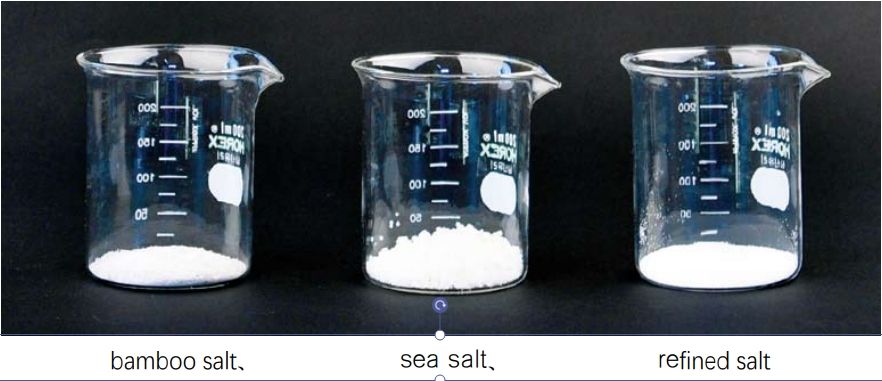
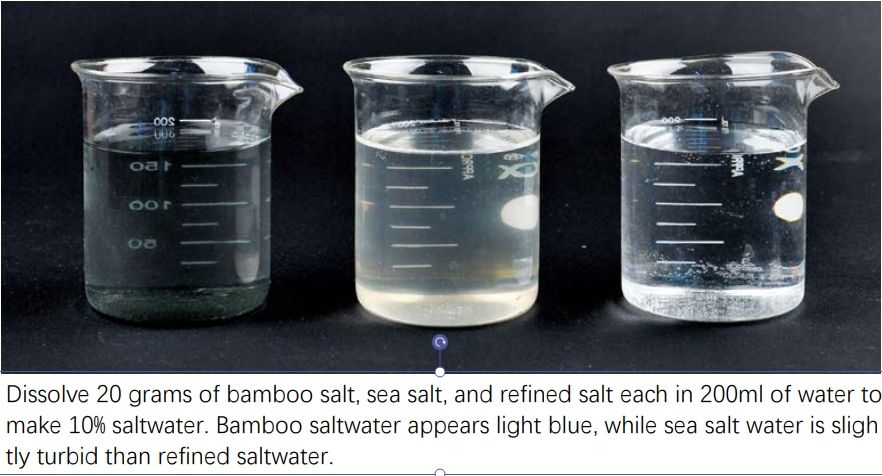
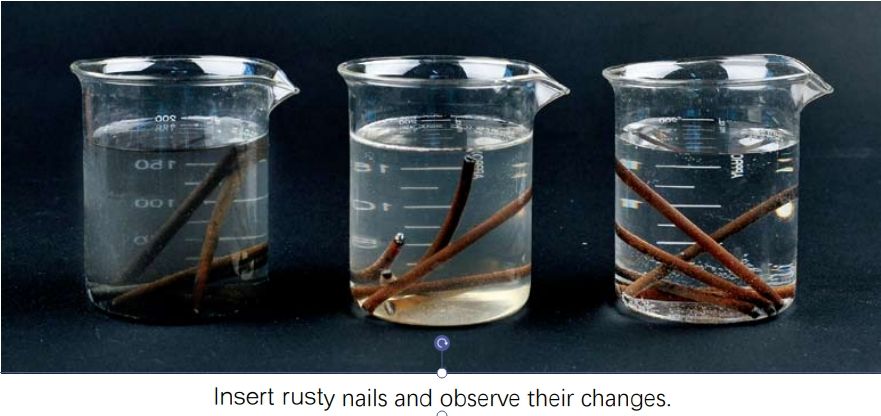
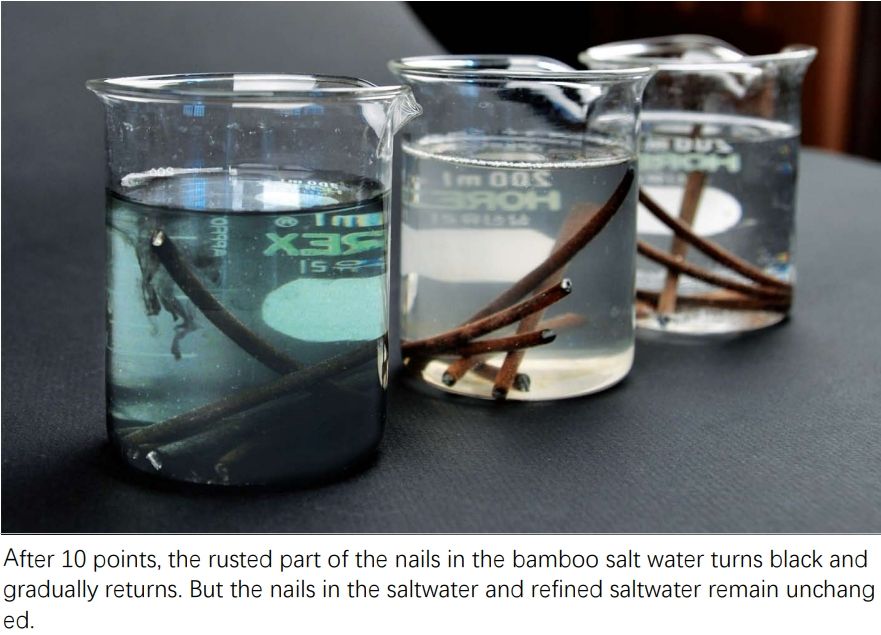
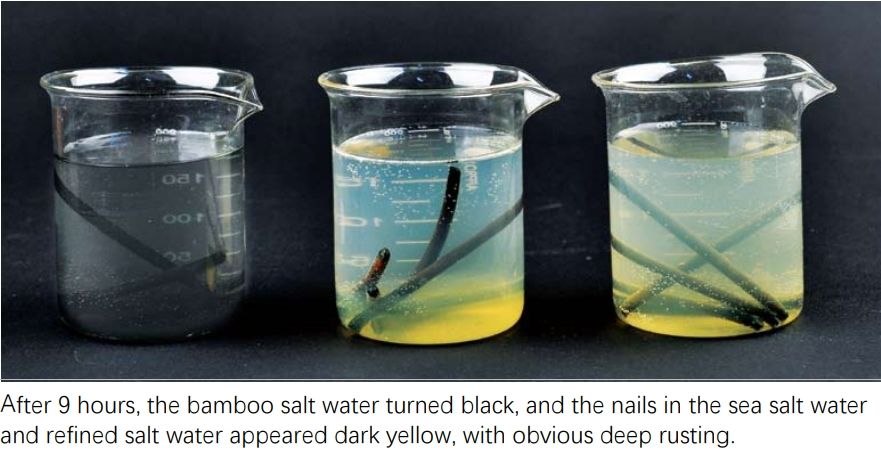
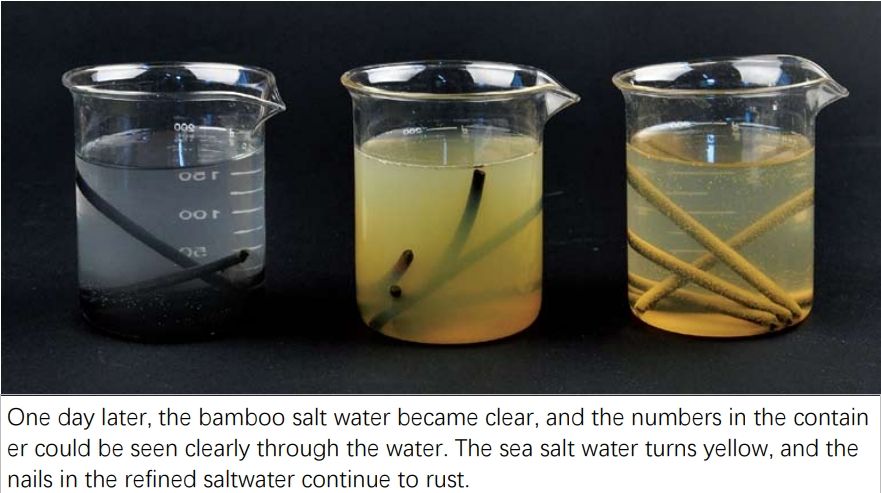
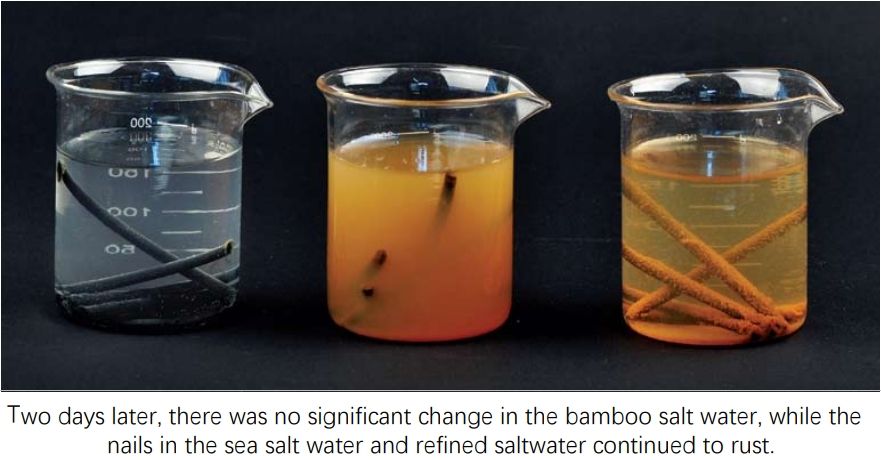
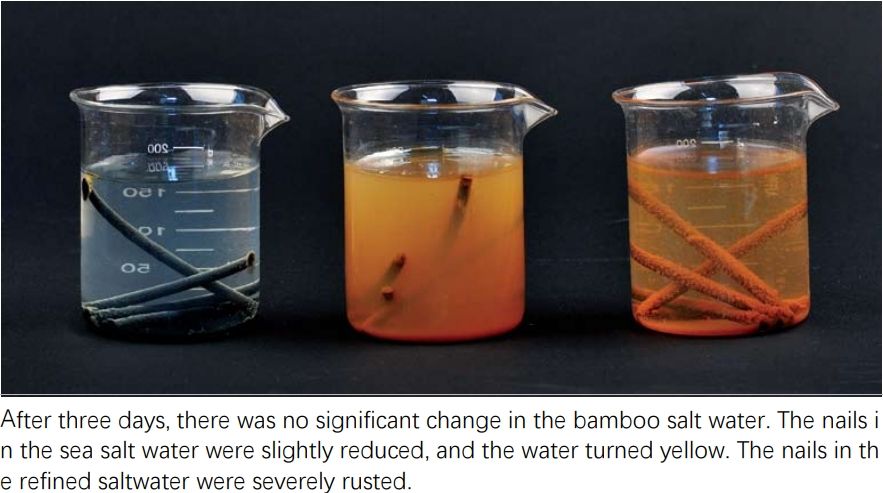
Conclusion: Bamboo salt water undergoes a reduction reaction, while sea salt water and refined salt water undergo an oxidation reaction. So, what are the reasons that cause different reactions? The hydrogen ions produced by the dissolution of bamboo salt in water, as well as the minerals ionized by silicon and manganese, decompose and reduce the rust of nails. Sea salt contains many minerals, but it cannot undergo a reduction reaction because when natural salts dissolve in water, the mineral components of sea salt cannot provide ions to cause a reduction reaction.
Bamboo salt is a physiologically active substance
What is a physiologically active substance? All active substances that have an impact on biological physiological phenomena are collectively referred to as physiological active substances. Abnormal pathological phenomena such as deficiency or excessive secretion of substances involved in regulating biological functions. Physiologically active substances have antioxidant effects, detoxification, immune enhancement functions, hormone regulation functions, antibacterial and antiviral effects, delaying aging, and preventing various modern life diseases. Bamboo salt is a good antioxidant material, and various minerals in bamboo salt can activate active enzymes in the human body, help detoxify the body, and is also a raw material for producing hormones. Bamboo salt also has antibacterial effects, enhancing immunity and preventing various diseases. Therefore, bamboo salt is an excellent physiological active substance that synthesizes natural minerals from nature with salt without any side effects.
Scientific research on salt is urgent
When we buy clothes, we choose colors, look at styles, feel the texture, and even try on clothes, which are really demanding. But it is closely related to our health, and we don't care about the salt we eat every day. I only try my best to improve the taste of dishes, but I am ignorant of the salt that determines the taste. Salt plays a significant role in human health, but why does this phenomenon occur? Due to the fact that "The Harm of Salt" has deeply rooted itself in the mind, neglecting the systematic and scientific research on salt. Modern science has neglected to clarify the types of salt, its effects on the body, and its pharmacological effects. "Salt elevates blood pressure", "Excessive intake of salt is harmful to health" and other "Salt hazard theories" have dominated the global village for 100 years. Does salt increase hypertension? As we observed earlier, different types of salt have significant differences in their effects on the body, which means that mineral rich salt can actually help maintain normal blood pressure. Is salt good for having more sodium elements? Na is one of the essential minerals in the entire human body.
Na plays a significant role in regulating the acid-base balance of human body fluids, conveying nerve stimulation, relaxing muscles, maintaining normal cardiac activation, absorbing nutrients, regulating and maintaining the pH value of saliva, pancreas, and intestinal fluid, and regulating blood pressure and other vital activities. Na is an essential mineral that constitutes the entire human body. Scientists say that excessive sodium is harmful to health, but if salt contains balanced potassium, calcium, and phosphorus, it can eliminate excess sodium from the body and lower blood pressure. This means that balanced minerals in the blood can maintain normal metabolism. On the contrary, when sodium (table salt) without balanced minerals enters the bloodstream, it cannot maintain normal metabolism and is harmful to health. What is important is the balance of minerals, not the side effects of sodium. What modern science looks at is the side effects of unbalanced sodium chloride (table salt). We should use the correct scientific perspective to treat the types of salt, analyze the composition of salt, analyze the state of salt composition, and study the proportion of mineral composition contained in salt. We should start by studying the pharmacological effects of bamboo salt. We need to have a correct understanding of the erroneous concept of "harmful to health, salt induces hypertension", otherwise modern science will lose its meaning and human health cannot be improved.